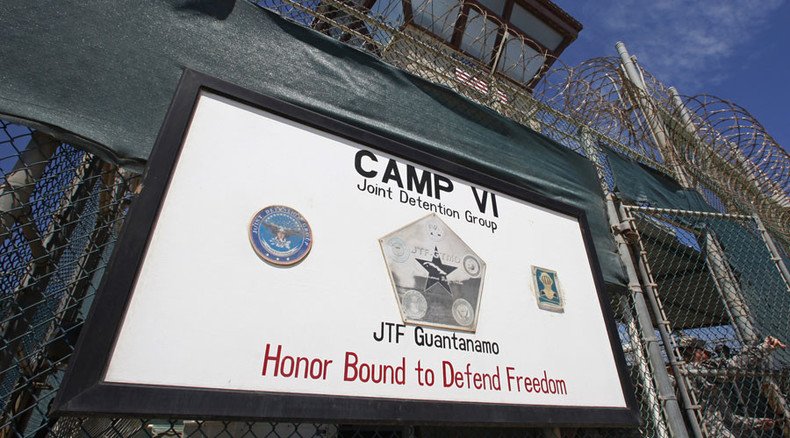Complaint filed demanding probe into high cancer rates among GITMO lawyers

A complaint has been filed with the US Navy Inspector General’s Office demanding that court facilities at Gitmo be tested for carcinogens and lawyers be evacuated from the base following reports of several cases of cancer among personnel there.
At least seven civilian and military staff members who took part in detainee trials at Guantanamo Bay have been diagnosed with cancer. Three of them, aged 35 to 52, have died in the last 13 months. One of them, US Navy Lieutenant Commander Bill Kuebler, a former Guantanamo war court lawyer, died just a week ago on July 17 at the age of 44.
Concerns among base personal have been particularly raised by the fact that Kuebler was diagnosed with a particularly virulent form of cancer first originating in his appendix, Reuters reported.
“We have been telling our chain-of-command for years that we don’t feel safe living and working in the temporary facilities the government has erected for military commissions,” said US Air Force Captain Michael Schwartz, a military defense lawyer who has worked at Guantanamo Bay for years, as quoted by Reuters.
READ MORE: Obama Gitmo plan: Kick out half, bring in half
The complaint calls the cancer rate alarming and claims that an unusually large number of relatively young and healthy people working on the base have come down with cancer, considering that only about 200 prosecutors, defense lawyers and other court personnel have served at Gitmo during the past ten years.
The report says nothing about an increase in cancer incidence for detainees, 116 of which are held in a separate part of the base.
The complaint also says that cancer cases on the base may be the result of Guantanamo personnel being exposed to carcinogens, as the location of the court had been formerly used as a jet fuel disposal dump, and toxins such as asbestos were used in the construction of the buildings hosting military trials.
The compound where the Gitmo court staff lives and works includes buildings that had already been closed before the Pentagon created a detention center on the base in 2002, the Miami Herald reports.
READ MORE: Gitmo nurse who refused to torture inmates faces Navy retaliation – lawyer
“But, along with the Constitution, the government seems to want to sweep this under the rug,” Schwartz added.
“There appears to be a cancer cluster surrounding the military commissions at Guantanamo,” said J. Wells Dixon, a lawyer with the Center for Constitutional Rights, adding that “the Centers for Disease Control should be brought in to investigate the matter thoroughly.”
“The Department of Defense is aware of concerns about possible carcinogens around the Department of Defense Military Commissions site,” said base spokeswoman Kelly Wirfel by email from Guantánamo Monday afternoon, as quoted by Reuters.
“We take any health concerns very seriously. Working together with the Navy Marine Corps Public Health Center and other environmental and health officials, Navy Region Southeast is looking into this to identify whatever steps may be necessary to address these concerns. We will keep everyone informed as we go along,” she added.
READ MORE: ‘Doesn’t make any fiscal sense’ to keep Gitmo open – DHS secretary
A spokesperson for the Defense Department Inspector General’s office has not confirmed or denied the initiation of any investigation so far. The Center for Disease Control also refused to comment on the issue.
Although the US Navy is looking into potential links between the living conditions at Guantanamo and the incidence of cancer there, it will be difficult to prove the existence of a cancer cluster on the base, say two medical specialists questioned by Reuters.
According to these medics, 7 cases among 200 people would be considered an abnormal rate of cancer in cases when all the patients had been diagnosed with the same type of cancer. However, 7 of 200 people developing different types of cancer could be considered normal.
The Miami Herald has created a list of cancer cases among Guantanamo personnel who worked at Camp Justice, the base’s court, for some period from 2008 to present. The list includes nine people who developed different types of cancer, including brain, appendix and colon cancer, as well as lymphoma.












